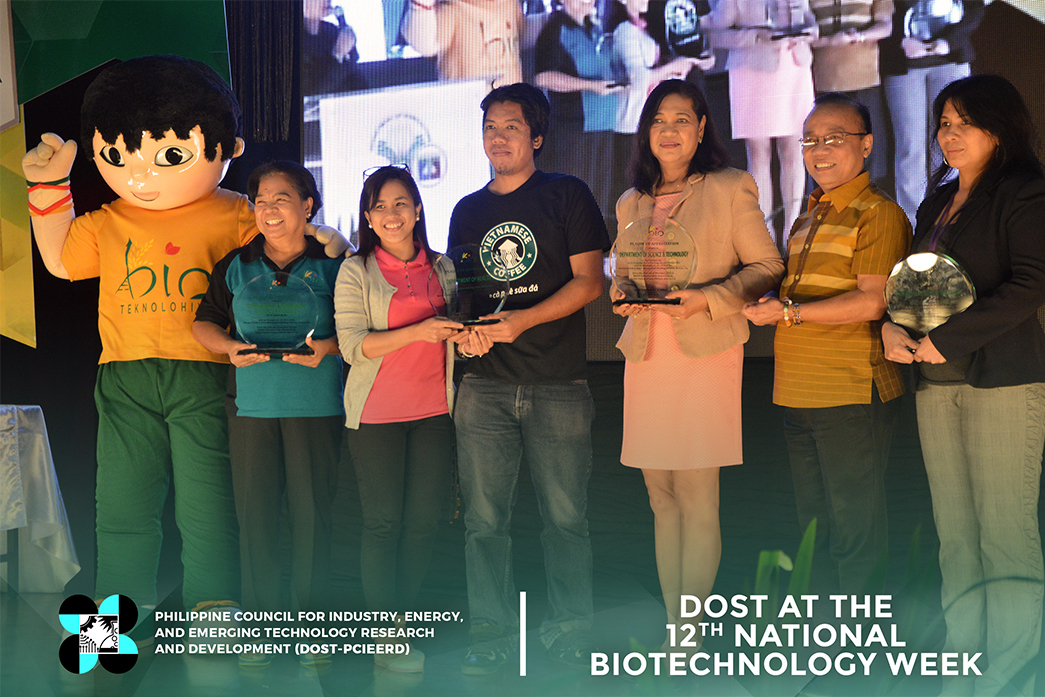QUEZON CITY – On November 21-25, 2016, our country celebrated the 12th National Biotechnology Week (NBW) in accordance to the Presidential Proclamation No. 1414, s. 2007 to recognize the importance of Biotechnology and its impact to the society.
NBW 2016 was held in the Bureau of Soils and Water Management (BSWM), Visayas Avenue, Quezon City with the theme, “Bioteknolohiya: Kaagapay sa Pangkalahatang Kaunlaran” and tagline: “Yakapin ang Pagbabago, Biotek na tayo!”
Department of Agriculture Secretary Emmanuel Piñol acknowledged how the theme ‘aptly reflects the heightened enthusiasm of the biotech sector to heed the President’s call for innovations so that it can contribute more to the fields of food and agriculture, health and wellness, industry, and resource management.’
The Department of Agriculture was elected as this year’s chairman of the inter-agency committee composed of the Departments of: Science and Technology, Education, Environment and Natural Resources, Interior and Local Government, and Trade and Industry.
The said celebration was composed of lectures, workshops and seminars, competitions, techno and trade exhibits. These activities highlighted the importance of Biotechnology and its application to food and agriculture, health, environment, and the industry.
“We can be proud to say that we have achieved significant strides in the promotion of a science-based culture, as we see more and more Filipinos embracing the benefits of this technology,” said Department of Science and Technology (DOST) Secretary Fortunato de la Peña.
Presidential Proclamation No. 1414 was signed in 2007 to promote Biotechnology in the country and recognize its increasingly vital role in our society. Biotechnology increases crop yields with improved value and quality of crops, and farm productivity; contributes in the development of vaccines, antibiotics, and other drugs which makes healthcare accessible to many; delivers benefits to the environment such as in the production of renewable energy, conservation of topsoil and protection of water quality; aids in meeting the increasing and sustained demands for improved food production system and health and wellness through the emergence of new industries. Also, forensic DNA Analysis and similar DNA technologies have hugely contributed in today’s administration of justice.
DOST-PCIEERD activities
|
At the NBW 2016, the Philippine Council for Industry, Energy and Emerging Technology Research and Development (PCIEERD) showcased two biotechnology-related projects, namely: Cacao Fermentation and Monascus purpureus as alternative colorant. The fermentation of Cacao is a project by the University of the Philippines Los Baños and DOST Industrial Technology Development Institute (ITDI) with funding from PCIEERD. This project performed microbial and chemical analyses on fermented Cacao beans with the aim of producing better quality cocoa products that are locally and globally competitive. |
 |
Monascus purpureus or Red Yeast Rice, is one of the many species of molds that is used for pigment production, giving off a mixture of colors like red, yellow, and violet. This project can serve as an alternative to the widely used colorant that is reported to have health-related concerns.
Aside from these exhibits, a forum on the importance of biodegradable plastics and edible fruit and vegetable coating was conducted on November 23, 2016 at the BSWM Convention Hall. Dr. Myrna O. Nisperos, one of PCIEERD’s Balik Scientists whose expertise is on food science and food technology, presented her research findings, achievements, on-going projects, and gave some inspiration and encouragement for the students to choose science-related careers during the forum. Grades 10-12 students from Philadelphia High School, Ismael Mathay Senior High School, Philippine Science High School, Ramon Magsaysay Cubao High School, Ernesto Rondon High School, Flora Ylagan High School, and Lagro High School participated in the activity.

During the open forum, students asked about the processes involved in edible food coating, the length of the process and if it can be shortened, and if they can do the projects on their own. On the other hand, some teachers inquired if the coating is already available in the market and how much it would cost, and more importantly, if there are any existing policy on biodegradable plastics.

Dr. Nisperos also shared her experience as a lecturer, researcher, chemist, and scientist to the audience and how she succeeded in her field saying it was all hard work and taking advantage of scholarships which started from DOST. She has developed and patented biodegradable plastic in the USA which is now used by many food companies. Another achievement by Dr. Nisperos is the edible food coating that can be applied to all fruits and vegetables. The Polytechnic University of the Philippines was the host institution of Dr. Nisperos for her research work.
“The Department of Science and Technology will remain supportive of the endeavors that will help in furthering initiatives to sustain modern biotechnology. Likewise, we shall be at the forefront of ensuring that the best and available science is utilized and applied in the crafting of policies, guidelines, and decisions regarding modern biotechnology,” DOST Secretary De La Peña added in his message.





